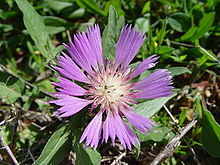Knapweeds
| Centaurea | |
|---|---|
 |
|
| Centaurea pullata | |
| Scientific classification | |
| Kingdom: | Plantae |
| Clade: | Angiosperms |
| Clade: | Eudicots |
| Clade: | Asterids |
| Order: | Asterales |
| Family: | Asteraceae |
| Subtribe: | Centaureinae |
| Genus: |
Centaurea L. |
| Type species | |
|
Centaurea centaurium L. |
|
| Diversity | |
| About 350-600 species | |
| Synonyms | |
Cyanus L.
Plectocephalus D.Don in R.Sweet (but see text)
Centaurea (/ˌsɛntɔːˈriːə/) is a genus of between 350 and 600 species of herbaceous thistle-like flowering plants in the family Asteraceae. Members of the genus are found only north of the equator, mostly in the Eastern Hemisphere; the Middle East and surrounding regions are particularly species-rich. Common names for this genus are centaury, centory, starthistles, knapweeds, centaureas and the more ambiguous "bluets"; a vernacular name used for these plants in parts of England is "loggerheads" (common knapweed). The Plectocephalus group – possibly a distinct genus – is known as basketflowers. "Cornflowers" is used for a few species, but that term more often specifically means C. cyanus (sometimes also called "basket flower"). The common name "centaury" is sometimes used, although this also refers to the unrelated plant genus Centaurium.
Knapweeds are robust weedy plants. Their leaves, spiny in some species, are usually deeply divided into elongated lobes at least in the plants' lower part, becoming entire towards the top. The "flowers" (actually pseudanthium inflorescences) are diverse in colour, ranging from intense blues, reds and yellows to any mixture of these and lighter shades towards white. Often, the disk flowers are much darker or lighter than the ray flowers, which also differ in morphology and are sterile. Each pseudanthium sits atop a cup- or basket-like cluster of scaly bracts, hence the name "basketflowers". Many species, in particular those inhabiting more arid regions, have a long and strong taproot.
...
Wikipedia
